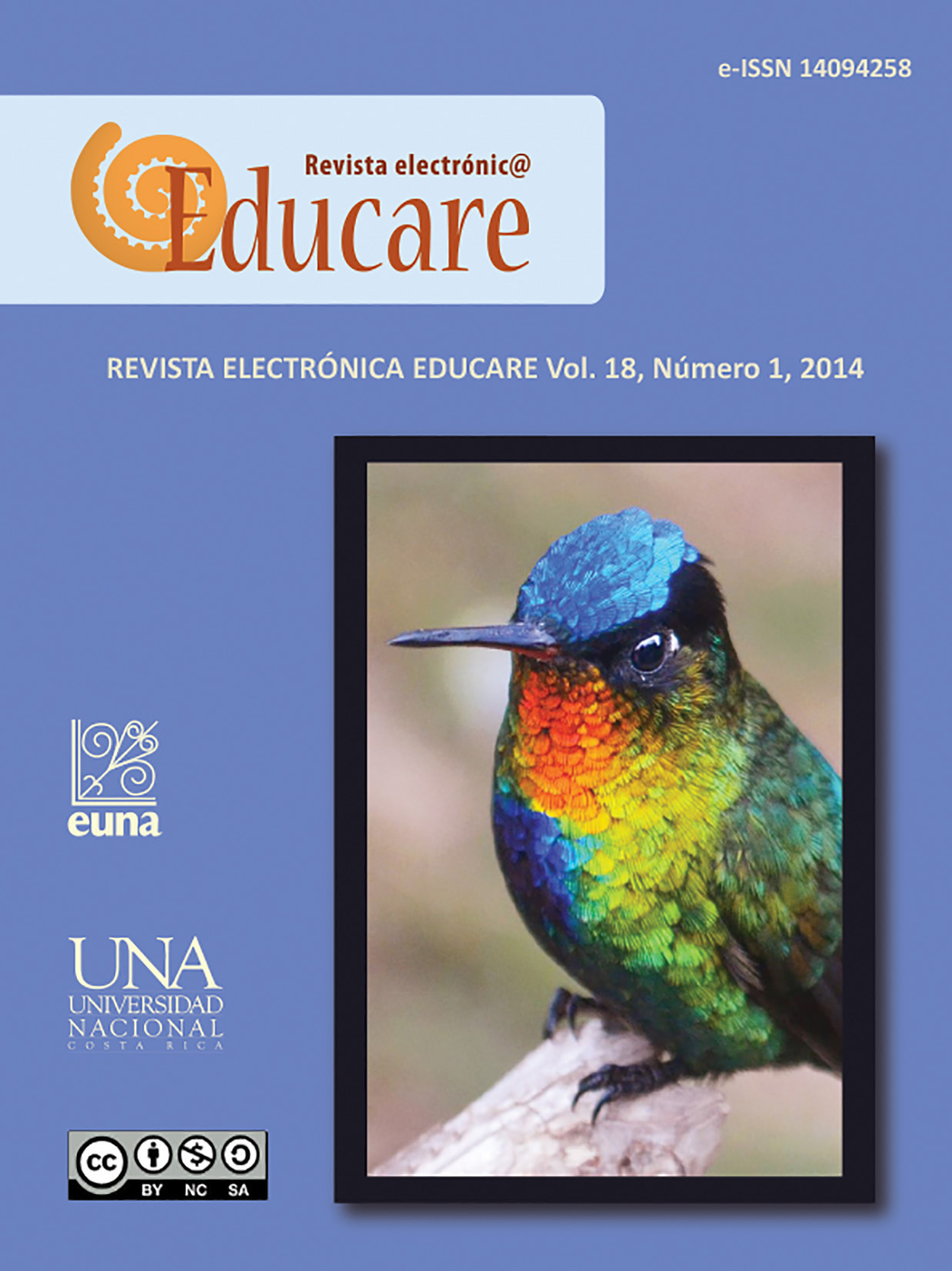Multiplier Modality in Parent Counseling
DOI:
https://doi.org/10.15359/ree.18-1.10Keywords:
Family counseling, multiplier modality, participative methodology, parents’ experiences.Abstract
This article summarizes a counseling experience with parents from educational institutions in the provinces of San José and Heredia, Costa Rica. The multiplier modality was the strategy used in the Social Action Project entitled “Family Strengthening”, from the Education for Work Division (DET) at Universidad Nacional, Costa Rica. A group of counseling professionals and educators from this Division trained eighteen professionals, including counselors and other specialists, as facilitators on topics such as family communication, anger management, family worldview, and project planning in order to work with parents using a participative methodology, which took into account the experiences of participants involved in family counseling projects. Projects were implemented in 9 institutions, and a total of 105 mothers and 6 fathers participated. The section summarizing achievements highlights the impact of the methodological shift from “lectures” to parent participation, where they share their own vital experiences on family life. Knowledge obtained has been essential for expanding and continuing this parent counseling project.
References
Beavers, W. R. y Hampson, R. B. (1995). Familias exitosas: Evaluación, tratamiento e intervención. Barcelona: Paidós.
Calderón, E., Murillo, J., Villalobos, A., Villanueva, R. y Villarreal, C. (2009). Proyecto Fortalecimiento de la familia. (Informe final 2007-2009, código unidad ejecutora 050804 y presupuestario 031501) Heredia: División de Educación para el Trabajo, CIDE, Universidad Nacional.
Dinkmeyer, D., Sr., Mckay, G. D. y Dinkmeyer, D., Jr. (1998). Guía para los padres. Preparación sistemática para educar bien a los hijos. Estados Unidos: STEP Publisher.
Fuhrmann, I. y Chadwick, M. (1998). Fortalecer la familia. Manual para trabajar con padres (3ª ed.). Santiago: Editorial Andrés Bello.
García, N. (2001). La orientación en grupos. En R. Bisquerra (Coord.), Modelos de orientación e intervención psicopedagógica (pp. 341-362) Barcelona: CISSPRAXIS.
López, S. y Escudero, V. (2003). Familia, evaluación e intervención. Madrid: Editorial CCS.
Richardson, R. W. (1993). Vivir feliz en familia. Barcelona: Paidós.
Sanz, R. (2007). Orientación psicopedagógica y calidad educativa. Madrid: Pirámide.
Satir, V. (2005). Nuevas relaciones humanas en el núcleo familiar (2ª ed.). México, DF: Editorial Pax.
Watzlawick, P., Beavin, J. y De Avila, D. (2002). Teoría de la comunicación humana. Barcelona: Editorial Herder.
Downloads
Published
How to Cite
Issue
Section
License
1. In case the submitted paper is accepted for publication, the author(s) FREELY, COSTLESS, EXCLUSIVELY AND FOR AN INDEFINITE TERM transfer copyrights and patrimonial rights to Universidad Nacional (UNA, Costa Rica). For more details check the Originality Statement and Copyright Transfer Agreement
2. REUTILIZATION RIGHTS: UNA authorizes authors to use, for any purpose (among them selfarchiving or autoarchiving) and to publish in the Internet in any electronic site, the paper´'s final version, both approved and published (post print), as long as it is done with a non commercial purpose, does not generate derivates without previous consentment and recognizes both publisher's name and authorship.
3. The submission and possible publication of the paper in the Educare Electronic Journal is ruled by the Journal’s editorial policies, the institutional rules of Universidad Nacional and the laws of the Republic of Costa Rica. Additionally, any possible difference of opinion or future dispute shall be settled in accordance with the mechanisms of Alternative Dispute Resolution and the Costa Rican Jurisdiction.
4. In all cases, it is understood that the opinions issued are those of the authors and do not necessarily reflect the position and opinion of Educare, CIDE or Universidad Nacional, Costa Rica. It is also understood that, in the exercise of academic freedom, the authors have carried out a rogorous scientific-academic process of research, reflection and argumentation thar lays within the thematic scope of interest of the Journal.
5. The papers published by Educare Electronic Journal use a Creative Commons License:














 The articles published by Educare Electronic Journal can be shared with a Creative Commons License:
The articles published by Educare Electronic Journal can be shared with a Creative Commons License: 



